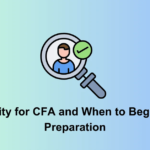If you’re planning a career in finance, the CFA program is one of the most respected paths you can take. But before you dive into the exam prep, it’s important to understand the Eligibility for CFA — who can apply, what the rules are, and how to get started right. A solid grasp of these criteria clears up confusion and helps you plan your CFA journey better.
Why Eligibility Matters
Many candidates begin preparing for the CFA exam without checking their eligibility, and that can lead to unnecessary stress or wasted effort. When you know exactly what qualifies you, you can plan your exam registration, study timelines, and work or college balance more sensibly. The EdZeb blog explains these eligibility criteria in simple language, making it easier for you to decide whether you’re ready to start the CFA program.
Key Eligibility Criteria for CFA
1. Education Requirement
To be eligible for CFA Level 1, one of the following must apply:
- Bachelor’s Degree: If you’ve already completed a bachelor’s degree (in any subject), you’re ready to register.
- Final-Year Student: If you are in your final two years of undergraduate study, you can apply for Level 1 early. According to EdZeb, this makes the CFA more accessible and allows students to start sooner.
- Work Experience Alternative: If you don’t have a degree, you can still qualify through work experience. The requirement is 4,000 hours of full-time professional work or a mix of work and education adding up to 4,000 hours. Importantly, this work doesn’t have to be strictly in finance — it can be in any role that builds analytical or business skills.
2. Age Requirement
There’s no upper age limit for taking the CFA exam. You must be at least 18 years old, which means both students and working professionals can join without age being a barrier.
3. Passport Requirement
A valid international passport is mandatory to register for the CFA exams. The CFA Institute requires this to verify your identity when you sit for each exam. So, if you don’t have one yet, make sure to apply early — it’s a key eligibility checkpoint.
4. English Proficiency
All CFA exams are conducted in English. You don’t need a formal English certificate, but you should be comfortable reading study materials, understanding concepts, and writing answers in English.
5. Professional Conduct
When you apply, you must commit to the CFA Institute Code of Ethics and Professional Conduct. This rule shows how important ethical behavior is in the finance industry. CFA have to maintain high standards of honesty and integrity — and the Institute takes this seriously.
How to Apply for the CFA Exam
Once you confirm your eligibility, here’s how to register:
- Create an Account: Visit the CFA Institute website and create your candidate profile.
- Fill in Details: Enter your education or work experience and your background.
- Upload Passport Info: Please provide your passport number and details exactly as they appear on the document.
- Pay Fees: There’s a one-time enrollment fee, as well as exam registration fees.
- Choose Exam Window: Pick a test date that works for you — CFA offers multiple exam windows throughout the year.
After registering, you’ll get access to important exam resources and can plan your study strategy. For a full step-by-step guide, EdZeb’s blog breaks down everything clearly.
Who Should Consider the CFA Program?
- Students who want to build a finance career
- Professionals working in banking, consulting, or corporate finance
- Analysts focused on investments or equity research
- Anyone aiming for global finance exposure
Even if your current job isn’t in finance, CFA helps you build the skills needed for roles in portfolio management, risk analysis, investment banking, and more.
Benefits of Understanding Eligibility Early
- Better Planning: You can map out when to register, study, and appear for exams.
- Cost Efficiency: Early registration and a clear plan help you save on exam fees.
- Reduced Stress: You avoid the surprise of not qualifying later on.
- Confidence Boost: When you know you meet the requirements, you can focus fully on your studies rather than worrying about whether you can apply.
EdZeb’s blog not only clarifies these eligibility criteria but also offers guidance on how to plan your study schedule and register for exams.
When’s the Best Time to Start Your CFA Journey?
- Students: If you’re in your final two years, you can register for Level 1 early and align your exam schedule with your college timeline.
- Working Professionals: Use your work experience to qualify, then balance study with your job.
- Early Prep: Starting your study 4–6 months before the exam is ideal for covering the material well and doing plenty of practice.
In the EdZeb blog, you’ll find a detailed roadmap for when to start, how to build a study plan, and how to practice with mock exams.
Conclusion
The CFA program offers a globally respected certification for those serious about finance. But before you begin, making sure you meet the Eligibility for CFA is essential. The good news? The requirements are flexible and designed for both students and working professionals.
Whether you have a bachelor’s degree, solid work experience, or a mix of both, there’s a clear path for you. EdZeb’s blog explains these eligibility rules in simple language so you can decide your next step confidently.
If you’re ready to apply or just want to explore more, check out the full eligibility guide on EdZeb’s blog here: https://www.edzeb.com/blog/eligibility-for-cfa/

